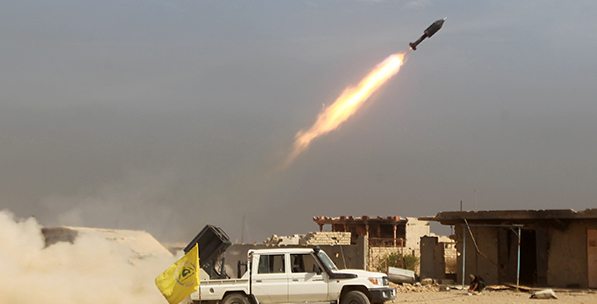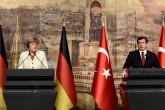The Syrian civil war has taken center stage as a point of tension not just in Middle Eastern politics, but also in global politics and Russia’s direct involvement has now added a new dimension to it. Although expressing that it had begun air operations against the Islamic State of Iraq and al-Sham (ISIS), it soon became apparent that Russia was targeting all organizations fighting against Syrian President Bashar Assad’s regime, the Free Syrian Army foremost among them. Russian airstrikes in Syria came to the fore as having the purpose of supporting the Assad regime, which has been delegitimized in the eyes of the international community as well as in its own country. In a sense, Russia came to the rescue at a point in the Syrian civil war which pro-Assad Iran had started to weaken.
Russia’s attempt to expand its influence in the Middle East is part of its desire to portray itself as a global actor. The U.S.’s non-active involvement in the Syrian crisis has caused serious power vacuums to appear in the region, and Russia has chosen to fill these spaces. In this way, Russia has caused the perception that it is the leading initiative in Syria. This situation has now pushed the U.S. into taking a more active stance for its Syrian policy. This is due to the understanding that from the U.S.’s point of view, Russia’s actions are complicating U.S. Middle Eastern policy.
While beginning airstrikes, Russia said it did not want the Assad regime to remain in power forever, but if the Assad regime were to be removed, “radical organizations” would rise in Syria. Interestingly enough, this particular thesis has actually been a thesis defended by the Western bloc for Middle Eastern countries for years. The need to support autocratic administrations in the Arab world due to the threat of the rise of radical fundamentalist organizations has been around for a while. In fact, this thesis has been mentioned by U.S. foreign policy makers specifically for Syria.
This discursive partnership is the most important element that makes negotiations for common ground possible between Russia and the U.S. on Syria.
With all this going on, Assad was abruptly invited to Moscow and met with Russian President Vladimir Putin two days ago. In the meeting, Putin reportedly expressed to Assad the need that “all political powers and religious groups must come together for a long-term solution to the Syrian crisis.”
These statements by Putin were interpreted as a sign of partnership in the context of the Syrian crisis between the U.S. and Russia. It is unknown whether this much significance can be given to Putin’s statements, but we can say that preparations have begun for Syria after Assad. So, in this sense, we can say that Russia’s intervention in Syria is not just to protect Assad, but rather due to its desire to become the main actor in the formation of a post-Assad Syria. For the U.S., which regards ISIS as the primary issue of the Syrian crisis, this does not seem to be particularly problematic at this point.
In such a situation, what will Ankara’s attitude be? Ankara has clearly said that it is willing to provide every assistance to Syria in a post-Assad period. Turkey’s status is that of the country that has most directly experienced the effects of the Syrian civil war. Because of the Syrian civil war, Turkey is left face-to-face with serious problems in politics, society and economics.
Above all else, the flow of Syrian refugees into Turkey is creating serious socio-economic and socio-political costs. Turkey is grimly trying to bear this burden. Alongside this, Ankara says that a new wave of refugees might come from Syria and is attempting to prevent them from coming. As such, it is trying to add EU countries into the solution of this problem, but not finding the necessary support in this case either.
Together with this, the Syrian crisis is allowing terrorist organizations to expand their areas in Turkey, which is causing serious costs in terms of lives, loss of property and destabilizing the political system. In this context, the PKK has used the opportunities provided by the Syrian civil war to increase its activity in Turkey and to renew its armed struggle against the state. From July onward, the PKK has killed 161 security personnel. Aside from the PKK, ISIS has also begun bloody terror activities in Turkey and committed massacres in Suruç and Ankara. Armed leftist organizations have also grown stronger amid the Syrian civil war and have engaged in various terror activities in order to support the Assad regime.
Ever since the start of the Syrian crisis in March 2011, Ankara has asserted that the Assad regime was the source of the problem and that unless a political solution could be created for the Syrian problem, much greater problems would be faced. Ankara was correct in its theses. The Syrian crisis created ISIS. This brought along the problem of foreign fighters. Then came a refugees in such proportions that it was enough to make Europe quake in fear.
Currently, the elimination of the Assad regime, the source of the Syrian crisis, is on the agenda. And at this point, leaving the process in Russian control would be a big mistake. Another mistake would be to ignore Iran’s attempts at political influence in the region. The healthy design of a post-Assad Syria depends on the establishment of democracy, the building of a framework wherein all societal elements can participate in politics and the implementation of practical international development programs independent of global powers’ struggle for influence.
[Daily Sabah, October 23, 2015]
In this article
- Foreign Policy
- Opinion
- 2011
- 2015
- Arab world
- Assad Regime
- Bashar Al Assad
- Civil War
- DAESH
- Daily Sabah
- Europe
- European Union (EU)
- Foreign Fighters
- Free Syrian Army
- Free Syrian Army (FSA)
- Global Actors | Local Actors
- Global Power
- Intervention in Syria
- Iraq
- Islam
- Islamic
- Islamic Republic of Iran
- Kurdistan Workers' Party Terrorist Organization (PKK)
- Middle East
- PKK - YPG - SDF - PYD - YPJ - SDG - HBDH - HPG - KCK - PJAK - TAK - YBŞ
- Russia
- Syria
- Syrian Civil War
- Syrian Conflict
- Syrian Crisis
- Syrian Refugees
- Syrian Regime
- Terror
- United States (US)
- US Foreign Policy
- Western Bloc
- Western World



